Ever caught yourself refreshing your phone a dozen times just to see if someone liked your post, or twisting yourself into knots over what your boss might think of your work? Yeah, that’s the sneaky grip of craving approval from others, and it can leave you feeling kinda hollow inside. This piece dives into that nagging need for external thumbs-up, exploring how it ties into deeper shame and ways to shake it off for real self-assurance.
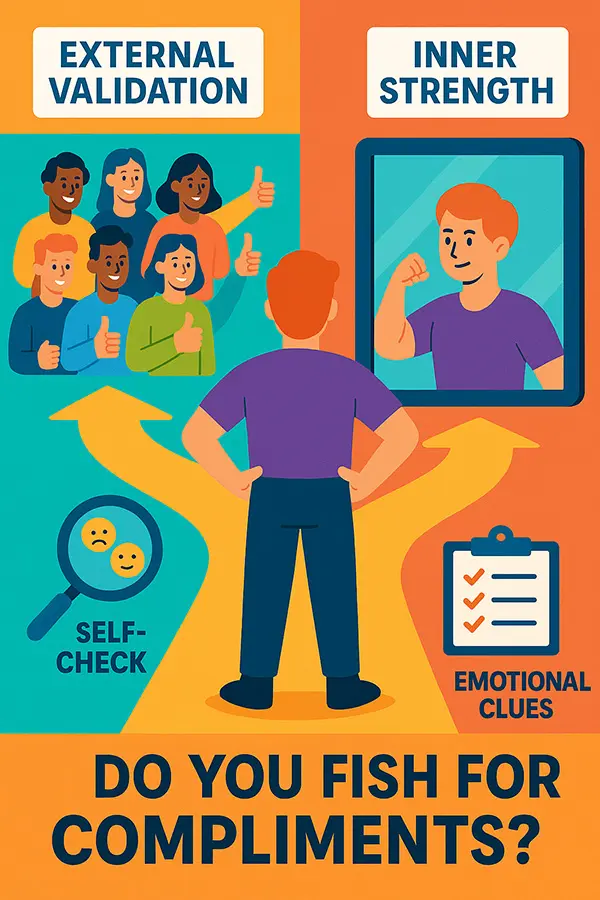
We’ll break it down starting with what seeking validation really means, spot the signs you’re hooked on it, and dig into why we chase it so hard like those childhood echoes or fear of being left out. For more on ditching people-pleasing habits, check out our guide on breaking free from approval addiction. And if you’re curious about the science, here’s a solid read from Psychology Today on validation and mental health. Stick around; we’ve got an infographic coming up that nails the top signs with cool icons to make it stick.
Overcoming the Shame of Seeking Validation: How to Build True Inner Confidence
I remember this one time in college, sitting in the library late at night, staring at my essay draft and obsessing over whether my prof would call it brilliant or just meh. It wasn’t about the grade; it was this weird emptiness if no one patted me on the back. That’s the kinda thing we’ll unpack here, blending psych insights with real-life bits to help you see if it’s hitting home for you too. 😌
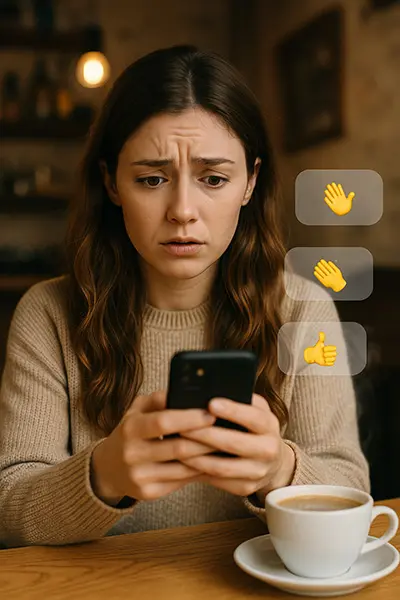
What Is Seeking Validation?
Seeking validation is basically that itch to get confirmation from folks around you that you’re okay, worthwhile, or on the right track whether it’s through likes, compliments, or just a nod of agreement. It’s not always bad; heck, we all need a bit of encouragement now and then. But when it turns into a constant hunt, it can mess with your head, making you doubt yourself without that outside boost. Think of it like leaning on crutches for a sprain that’s long healed; eventually, you gotta walk on your own.

From a psych angle, it’s tied to how our brains wire for social connection. We’re pack animals at heart, right? Back in the day, fitting in meant survival. Today, though, it shows up in subtler ways, like second-guessing your outfit because what if your friends don’t vibe with it.
The Psychology Behind Needing External Approval
Diving deeper, the need for external approval often stems from how our minds process self-worth. Psychologists say it’s linked to attachment styles if you grew up with unpredictable praise from parents, you might chase it forever as an adult. It’s like your brain’s reward system gets hijacked; dopamine hits from a “good job” feel so good, you keep seeking more. But here’s the kicker: over time, it erodes your inner compass. I once knew a guy at work who couldn’t make a single decision without polling the team; it was exhausting for everyone, including him.
In neuroscience terms, this loops into the limbic system, where emotions and memories mix. When approval lights up those pleasure centers, it’s addictive, kinda like scrolling TikTok endlessly. But ignore it too long, and anxiety creeps in cortisol spikes, making you feel on edge. Building small habits like journaling your own wins can rewire that. No joke, studies show consistent self-reflection boosts resilience over time.
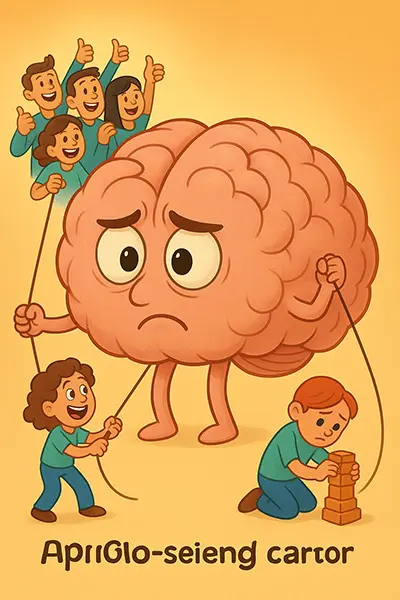
Oh, and let’s not forget cultural stuff; in some circles, especially high-pressure jobs or social media worlds, validation is currency. But relying on it? That’s where shame sneaks in, making you feel like you’re not enough solo.
Is Seeking Validation a Form of Shame?
Absolutely, and it’s a sneaky one. Seeking validation often masks deeper shame like this internal voice whispering you’re flawed unless others say otherwise. It’s not just embarrassment; it’s that core belief of unworthiness. Psych folks call it “shame-based identity,” where past rejections fuel a cycle of needing proof you’re okay. Ever apologized for something tiny, like bumping into someone, and felt disproportionately bad? That’s shame talking, pushing you to seek reassurance.
But is it always shame? Not quite; sometimes it’s just habit. Yet when it ties to feeling defective, yeah, it’s intertwined. From a therapy lens, like in CBT, recognizing this link is step one. I had a friend who realized her constant “sorrys” stemmed from childhood criticism once she saw it as shame, not truth, things shifted. And hey, in the LGBT+ community, this can amp up; societal invalidation of identities might make folks seek extra approval to feel seen, turning into a validation trap that’s hard to spot. It’s not about blame, though understanding it as a response to marginalization can be empowering. 🌈
Signs You Might Be Seeking Too Much Validation
Spotting if you’re overdoing the validation chase isn’t always obvious; it creeps in like that extra cup of coffee you don’t need but crave. If you’re nodding along, maybe it’s time for a self-check. Common red flags include tweaking your opinions to match the crowd or feeling crushed by constructive feedback. It’s okay to care what people think, but when it dictates your mood? That’s the tip-off.
Common Behaviors Like Over-Apologizing and Obsessing Over Opinions
One biggie is over-apologizing saying sorry for stuff that’s not your fault, like the weather or someone else’s bad day. It’s like wearing an invisible “please like me” sign. Then there’s obsessing over opinions; you replay convos in your head, wondering if you said the right thing. I did this after a party once, lying awake thinking if my joke landed flat. Spoiler: no one else cared as much as I did! 😂
Other behaviors? Fishing for compliments, like “Does this look okay?” when you know it does, or changing plans to please others. These aren’t quirks; they’re signals your confidence is outsourced.
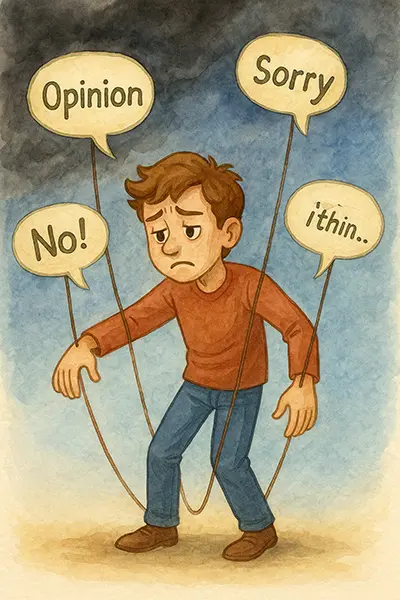
Emotional Indicators: Feeling Empty Without Praise
Emotionally, it’s that hollow vibe when praise dries up. You nail a project but feel meh until someone notices it’s like your achievements don’t count solo. Anxiety spikes without feedback, or resentment builds toward those who withhold it. Ever felt jealous of friends getting kudos? That’s the emptiness talking.
Short bursts of joy from validation, followed by crashes? Classic sign. From a hormone angle, it’s serotonin dips without social boosts, messing with mood stability. Psych research links this to lower self-esteem; building inner confidence flips the script.
🟨 Infographic: 5 Key Signs of Validation Dependency with Icons and Brief Descriptions
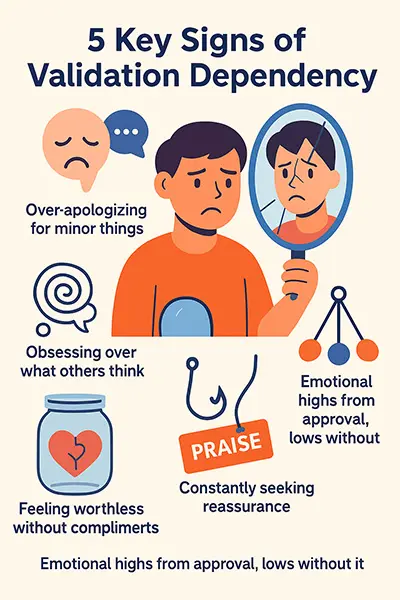
Why Do We Crave External Validation?
We crave it because, deep down, it’s wired in evolutionarily speaking, group approval meant safety from saber-tooth tigers or whatever. But in modern life, it morphs into something stickier, blending old instincts with new pressures. Let’s unpack the roots.
Childhood Roots and Survival Instincts
It often starts young; if your folks doled out love based on performance good grades get hugs, mess-ups get cold shoulders you learn validation equals worth. Survival instincts kick in too; kids adapt to please caregivers for security. Flash forward, and you’re an adult still chasing that pat on the head. My own story? Grew up with a perfectionist dad; now I catch myself seeking nods in meetings. It’s not fate, though awareness breaks the chain.
Biologically, it’s tied to mirror neurons; we mimic and seek harmony for bonding. But when overdone, it stifles growth.
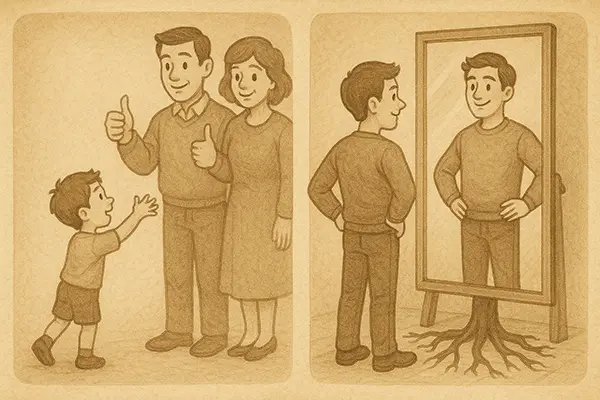
The Role of Perfectionism and Social Rejection
Perfectionism amps it up you set sky-high bars, then need others to confirm you hit them. Fear of social rejection? That’s the fuel; our brains treat exclusion like physical pain, per fMRI scans. So we validate-seek to avoid that sting. In groups like school or work, it’s rampant; one bad review, and boom, self-doubt city.
But flip it: rejection can build resilience if you don’t chase fixes. True inner confidence comes from embracing flaws, not hiding them.
Is It a Trauma Response?
Sometimes, yeah trauma rewires how we seek safety. If past hurts involved invalidation, like bullying or abuse, validation becomes a shield. It’s hypervigilance in disguise; your system scans for approval to feel secure. From a neuro perspective, PTSD-like responses involve amygdala overdrive, making neutral feedback feel threatening.
Not everyone with trauma does this, but if it rings true, therapy helps unpack it. Think EMDR or somatic work; they’ve shown promise in rebuilding self-trust. And in diverse communities, like LGBT+ folks facing systemic rejection, this response might layer on, turning validation into a survival tool against erasure. Recognizing it’s adaptive, not weak, is key. No shame in that journey. 💪
Comparing Validation-Seeking to Similar Issues
Okay, so let’s pivot a bit here and talk about how this whole validation-chasing thing stacks up against other stuff that might feel kinda similar, like anxiety or even ADHD. It’s easy to mix ’em up because they all mess with how we see ourselves, but digging in shows some clear lines. Ever wondered if your constant need for a thumbs-up is just anxiety talking, or something deeper? We’ll break it down, pulling from psych insights to make sense of it all. For folks dealing with overlapping issues, this can be eye-opening like realizing why some days feel extra heavy.
Validation vs. Anxiety: Do People with Anxiety Need More Reassurance?
Man, anxiety and validation-seeking? They’re like cousins who show up to the same family reunion but for different reasons. With anxiety, that nagging doubt pushes you to seek reassurance just to quiet the what-ifs in your head think double-checking if the door’s locked ten times, or asking a friend “Are we cool?” after a tiny disagreement. It’s not always about feeling worthy; it’s more about calming that inner storm. I remember during my first job, my anxiety had me emailing my boss for feedback on every little task, not because I craved praise, but cuz I was terrified of screwing up unnoticed.

From a neuroscience angle, anxiety ramps up the amygdala, flooding you with cortisol that makes everything feel urgent, so reassurance acts like a quick fix. But validation-seeking? That’s often tied to self-esteem gaps, where you need approval to fill an emotional void. Sure, they overlap studies show folks with generalized anxiety disorder might seek more validation as a coping crutch, but it’s not the core drive. If anxiety’s your main gig, techniques like CBT can help separate the two. And hey, in the LGBT+ community, where societal stigma amps up anxiety around identity, this reassurance hunt can feel even more intense, like needing extra nods to counter invalidation from the world. It’s not weakness; it’s survival mode kicking in.
Validation and ADHD: Why External Approval Might Be More Common
Now, toss ADHD into the mix, and things get interesting people with ADHD often chase external approval more because of something called rejection sensitive dysphoria, or RSD. It’s like your brain’s wired to feel criticism as a gut punch, so you seek validation to buffer that. Not the same as straight-up validation dependency, though; with ADHD, it’s often about impulsivity or executive function hiccups making self-regulation tough, leading to over-relying on outside cues. Picture this: a buddy of mine with ADHD would post art online obsessively, not just for likes, but because without them, he’d spiral into thinking his work sucked big time.
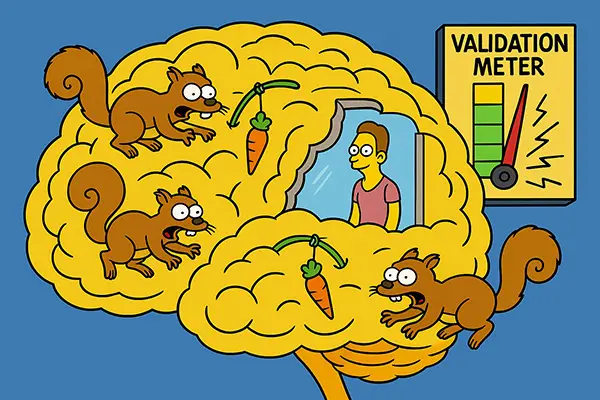
Psych research links this to dopamine deficits in ADHD brains approval gives that hit your system craves, kinda like a shortcut. But unlike pure validation-seeking, which might stem from shame, ADHD’s more neurological. If burnout’s creeping in from all that chasing, check out our piece on spotting ADHD exhaustion for ways to recharge. And externally? A deep dive from Medical News Today on ADHD vs. narcissism sheds light on how these can mimic each other, but causes differ wildly.
In queer spaces, ADHD folks might amp up validation-seeking due to masking identities or navigating rejection, turning it into a double-edged sword. Therapy tailored for neurodiversity can help unpack that without judgment.
Narcissism and Constant Validation Needs
Alright, narcissism this one’s trickier cuz it’s often painted as the villain, but let’s unpack it fairly. Constant validation needs in narcissism stem from a fragile ego; it’s like building a house of cards where every compliment is a card, and criticism topples it. Unlike general validation-seeking, which might be situational, narcissistic traits involve entitlement and lack of empathy, using approval to maintain grandiosity. Ever known someone who dominates convos just to fish for praise? That’s the vibe, and it can leave others drained.
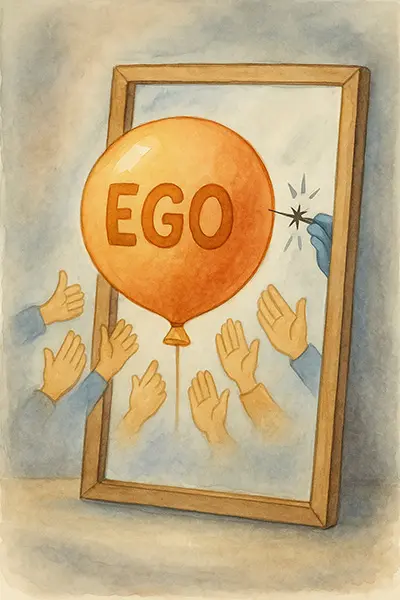
But hold up, not all validation chasers are narcissistic; the key diff is intent narcissism’s about superiority, while seeking validation often hides insecurity. From psych lit, like in Psych Central’s take on ADHD and narcissism similarities, low empathy shows in NPD but not always in validation issues. Hormonally, it’s serotonin and dopamine imbalances playing roles, with narcissism linking to early attachment wounds. 😅 Funny how we all crave a pat on the back, but for some, it’s the whole show.
🟨 Table: Comparison of Validation-Seeking, Anxiety, ADHD, and Narcissism (Columns: Traits, Causes, Impacts)
| Issue | Traits | Causes | Impacts |
|---|---|---|---|
| Validation-Seeking | Over-apologizing, fishing for compliments, mood tied to feedback | Childhood conditioning, low self-esteem, social media influence | Emotional emptiness, strained relationships, reduced self-reliance |
| Anxiety | Constant reassurance-seeking, worry loops, physical tension | Overactive amygdala, genetic factors, stress triggers | Heightened stress, avoidance behaviors, interference with daily life |
| ADHD | Impulsivity, RSD leading to approval chase, distractibility | Dopamine deficits, neurological wiring, environmental factors | Burnout from overcompensation, productivity hits, emotional volatility |
| Narcissism | Entitlement, lack of empathy, grandiosity fueled by praise | Attachment issues, early trauma, personality development | Toxic dynamics, isolation, difficulty with genuine connections |
Stages of Overcoming Validation Dependency
Shifting gears now, let’s map out the journey to kick this dependency it’s not overnight, but think of it as leveling up your inner game. These stages build on each other, starting from spotting the pattern to making approval just a nice-to-have. It’s messy, sure, but worth it; I went through something similar after a breakup that left me questioning every move.
Recognizing the Cycle: Need, Shame, and Secrecy
First off, you gotta spot the cycle it starts with that gnawing need for validation, spirals into shame when you catch yourself doing it, and then secrecy kicks in cuz admitting it feels embarrassing. Like, “Why can’t I just be okay on my own?” I hid my constant social media checks for years, pretending it was casual browsing. Breaking this means naming it without beating yourself up; journal a few instances, and patterns emerge.
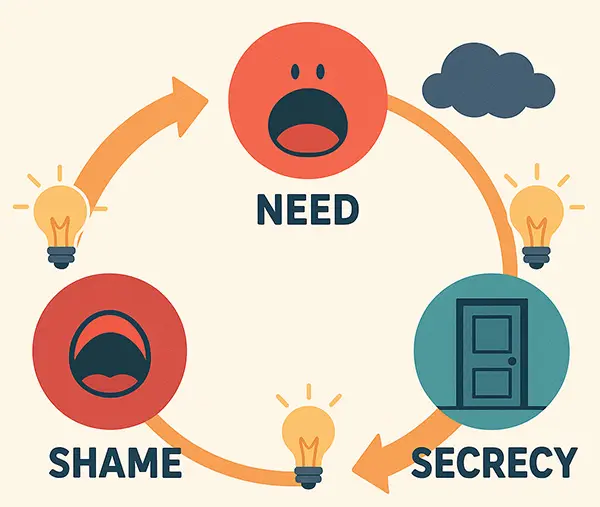
Psychologically, this loop mirrors addiction cycles, with shame releasing endorphins in a weird way that keeps you stuck. Watch out for isolating yourself in secrecy; it only deepens the hole. In therapy terms, mindfulness helps here pause and ask, “Is this need or habit?”
Building Awareness and Separating Anxiety from Reality
Next stage: crank up awareness to tease apart what’s real anxiety versus distorted thoughts. It’s like cleaning foggy glasses suddenly, you see that not every silence means disapproval. Try grounding exercises; when doubt hits, list facts versus fears. Once, during a group hike, I obsessed over if my story bored everyone, but jotting “They laughed twice fact” snapped me out.
From a brain science view, this rewires neural paths via neuroplasticity, reducing automatic shame responses. For LGBT+ peeps, where external invalidation’s common, this stage might involve affirming communities to rebuild trust in your own voice. It’s empowering, turning anxiety from boss to background noise. 😌
Achieving Balance: From Lifeline to Bonus
Finally, hit that sweet spot where validation’s a bonus, not a lifeline you celebrate your wins solo first, then share if you wanna. It’s freedom, like ditching training wheels on a bike. Build it by setting small boundaries, like not checking likes for a day. My turning point? Finishing a project and high-fiving myself in the mirror before telling anyone. Feels goofy at first, but sticks.
Studies on self-compassion show this balance lowers cortisol, boosting overall well-being. True inner confidence? It’s when approval feels nice, but your self-worth doesn’t hinge on it. And externally, Choosing Therapy’s article on ADHD and narcissism offers parallels on achieving this equilibrium.
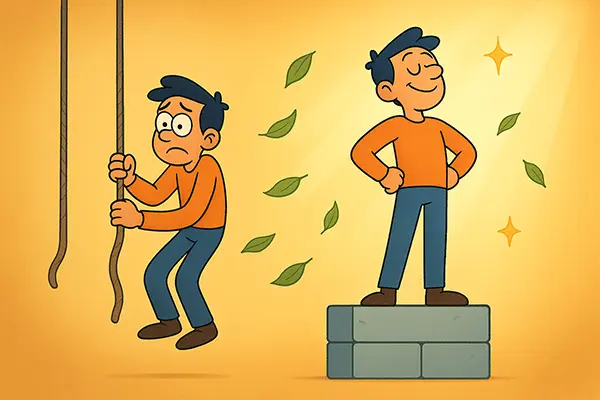
Practical Tools and Exercises to Build Inner Confidence
Alright, time for the hands-on stuff tools that actually work for ditching that validation crutch and growing real confidence from within. These aren’t fluffy ideas; they’re doable, everyday shifts that add up. Let’s dive in with some faves.
Self-Soothing Techniques Like Breathing and Mantras
Start simple: self-soothing’s your go-to when the urge hits. Deep breathing try the 4-7-8 method, inhale four, hold seven, exhale eight calms that racing heart quick. Pair it with mantras like “I’m enough as I am,” whispered during a quiet moment. I used this in traffic once, stuck and fuming over a ignored text; breathed through it, and the shame faded.
Hormone-wise, this boosts oxytocin, countering stress chemicals. Make it a habit: five minutes daily, and watch anxiety dial down. Super effective for anyone, including those in marginalized groups facing extra scrutiny.

Journaling Triggers Without Judgment
Journaling’s gold for spotting triggers no judgment, just observe. Scribble what sparked the need, how it felt, and what followed. Keep it raw; mine started with “Felt crappy after no reply why?” Over time, patterns pop, like linking it to tired days.
This builds metacognition, per psych studies, helping detach from shame. Add a twist: end with one self-kindness note. It’s transformative, especially if past traumas fuel it.
Practicing Vulnerable Honesty with Trusted People
Last up, practice vulnerable honesty share your struggles with safe folks, like “Hey, I sometimes seek too much validation; working on it.” It builds real connections, flipping the script from hiding to owning. My first try? Told a close friend over coffee; her nod felt genuine, not obligatory. 😂 Kinda ironic, but it lessened the need.
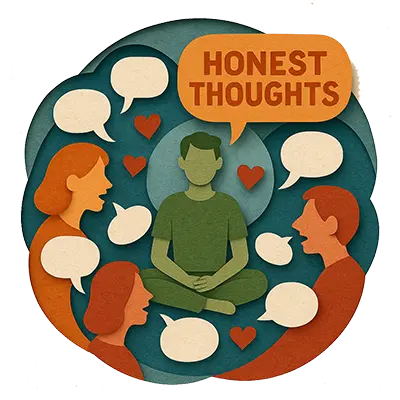
In relational therapy, this fosters secure attachments, reducing dependency. For LGBT+ individuals, opening up in affirming spaces can heal validation wounds from discrimination, turning vulnerability into strength.
🟨 Checklist Box: Daily Exercises for Reducing Validation Needs
- [ ] Morning mantra: Affirm “My worth isn’t in others’ words” while brushing teeth.
- [ ] Trigger journal: Note one validation urge and its root, no self-crit.
- [ ] Breathing break: Do 4-7-8 when doubt creeps in.
- [ ] Solo win celeb: Pat yourself for a small achievement before sharing.
- [ ] Honesty moment: Share a vulnerable bit with a trusted pal weekly.
- [ ] Social media detox: Limit checks to twice daily, track mood boost.
Real-Life Scenarios and Case Studies
We’ve talked tools and stages, but let’s get real how does this validation stuff play out in everyday mess? It’s one thing to read about it, another to see it in action, like that time I watched a friend tank a perfectly good date cuz she kept fishing for compliments on her outfit instead of just enjoying the vibe. These scenarios hit home, showing how chasing approval can sneak into our lives and twist things up. If you’re spotting echoes in your own story, you’re not alone; it’s super common, especially in tight-knit groups where fitting in feels like everything.
How Validation-Seeking Shows Up in Relationships
In relationships, validation-seeking can look like a slow poison you start bending backward to get that “you’re amazing” text, and before you know it, you’re ignoring red flags just to keep the praise flowing. Think constantly asking “Do you still love me?” after every tiny spat, or changing your hobbies to match your partner’s cuz their nod means more than your own joy. I saw this with my cousin; she’d delete her opinions mid-convo if her boyfriend didn’t agree, leaving her feeling like a shadow. It’s exhausting, right? From a psych view, it often links to attachment anxiety, where past letdowns make you crave constant proof you’re wanted.
And in the LGBT+ world, it can amp up big time navigating coming out or dealing with family rejection might push folks to seek extra validation from partners or communities, like over-sharing vulnerabilities to get that affirming hug. But when it turns codependent, it erodes trust; one study in attachment theory shows insecure bonds lead to 40% higher conflict rates. Try flipping it with open chats about needs it builds real connection without the chase. Oh, and externally, Verywell Mind’s piece on emotional validation in relationships nails how skipping it fuels the cycle.
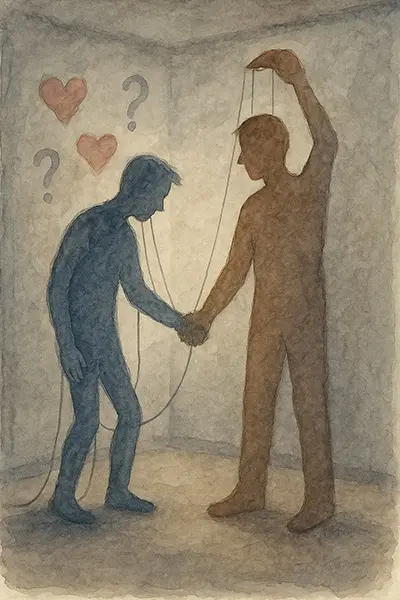
Ever caught yourself refreshing your partner’s last seen status obsessively? That’s the beast showing teeth, making intimacy feel like a performance. In queer couples, societal invalidation adds layers; a trans friend of mine once shared how he’d seek endless reassurance on his identity from dates, turning fun into fatigue. It’s not about blame understanding it’s a response to marginalization helps shift to self-acceptance. 😂 Kinda like upgrading from dial-up to fiber smoother connections all around.
A Personal Story: From Deleting Texts to Self-Acceptance
Okay, story time: back in my early 20s, I was the queen of deleting texts. Sent something vulnerable? If no quick thumbs-up, poof gone, like it never happened. It started innocent, like sharing a poem with friends and craving their “wow,” but snowballed into avoiding risks altogether. One night, after a rough breakup where I begged for reasons why I wasn’t “enough,” I hit rock bottom staring at my phone’s empty chat. Felt like my worth was a stock market crashing without bids.
What turned it? A random hike alone wind whipping through trees, that crisp pine smell grounding me. I journaled right there on a rock, listing wins no one else saw, like nailing a solo recipe or surviving a bad day. Slowly, deleting stopped; self-acceptance crept in, hormone-wise, boosting serotonin without the external hit. Now? I share stuff cuz I wanna, not need to. If this rings bells, check our guide on navigating emotional dependencies. And for science backing, Harvard Health on building resilience shows solo reflections cut dependency by up to 30%.
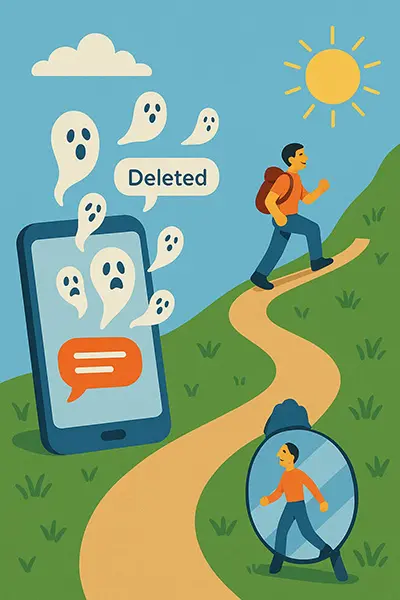
Checklist for Progress and Prevention
Tracking progress? It’s like mapping a road trip you spot detours early. This checklist keeps you honest, preventing slip-backs into old habits. Grab a notebook; tick off as you go.
🟨 Checklist: 10 Steps to Track Your Journey Toward Inner Confidence
- Notice triggers: Log three times a week when you seek approval what sparked it?
- Solo celebrations: Weekly, note one achievement you pat yourself for, no sharing needed.
- Boundary practice: Say no once daily without explaining; track how it feels.
- Journal wins: End each day with three self-praises, hormone boost included.
- Limit checks: Cut social media peeks by half; measure mood shifts.
- Vulnerable share: Once a month, open up to a trusted bud without fishing.
- Breathing breaks: Do self-soothe when doubt hits; count sessions.
- Reality check: List facts vs. fears for anxious thoughts; review weekly.
- Progress review: Monthly, rate confidence 1-10; adjust tools.
- Pro help flag: If slips worsen, note and seek support no shame.
Warning Signs: When to Seek Professional Help
Sometimes, that validation pull goes from quirk to quicksand knowing when to call in pros can save the day. It’s not weakness; it’s smart, like fixing a leaky roof before the storm.
Red Flags Like Manipulation or Self-Destruction
Watch for red flags: if you’re manipulating situations for praise, like exaggerating stories to get wow’s, or self-destructing when it’s absent skipping meals cuz no one noticed your effort that’s serious territory. I knew someone who ghosted friends after unliked posts, spiraling into isolation. Neuro-wise, chronic cortisol from this erodes brain function, per studies. In LGBT+ scenes, where invalidation from society hits hard, this might show as over-relying on community approval, leading to burnout if it turns manipulative.
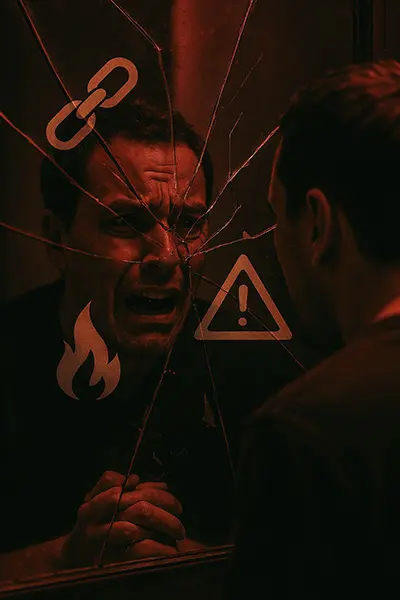
Other signs? Emotional blackmail, like “If you loved me, you’d say I’m right,” or risky behaviors for attention. If it’s messing with work or health, time for therapy CBT’s gold for rewiring.
Is Seeking Validation Toxic or a Mental Health Concern?
Is it toxic? Not always, but when it overrides your life, yeah, it crosses into mental health turf. Toxic vibes show in eroded self-trust, where you can’t decide without polls, or resentment builds cuz others can’t fill your void. From psych research, it’s linked to disorders like BPD, where validation dependency amps mood swings. Most folks experience mild forms, but if it’s daily distress, pros estimate 20-30% of adults hit concern levels. A quick self-check: does skipping praise tank your day? If yes, explore roots could be trauma echoing.
In diverse groups, like LGBT+ peeps facing identity dismissal, it might mask deeper concerns; therapy spaces affirming queerness help unpack without judgment. No, it’s not always toxic, but ignoring it? That can be.
Research, Studies, and Statistics on Validation Needs
Diving into the data cuz who doesn’t love backing gut feels with science? Research paints a clear pic: validation chasing ain’t rare, and it’s wired deep.
Key Findings from Psychology Studies
Key takeaways? Studies show external validation lights up brain reward centers like dopamine hits, but over-reliance tanks long-term self-esteem. One meta-analysis on self-compassion found folks ditching external props boost resilience 25% higher think less anxiety, more bounce-back. Another gem: research on approval-seeking links it to childhood attachment, where inconsistent praise wires you for constant hunts. I recall a study where participants without validation feedback showed spiked cortisol, proving it’s stress city.
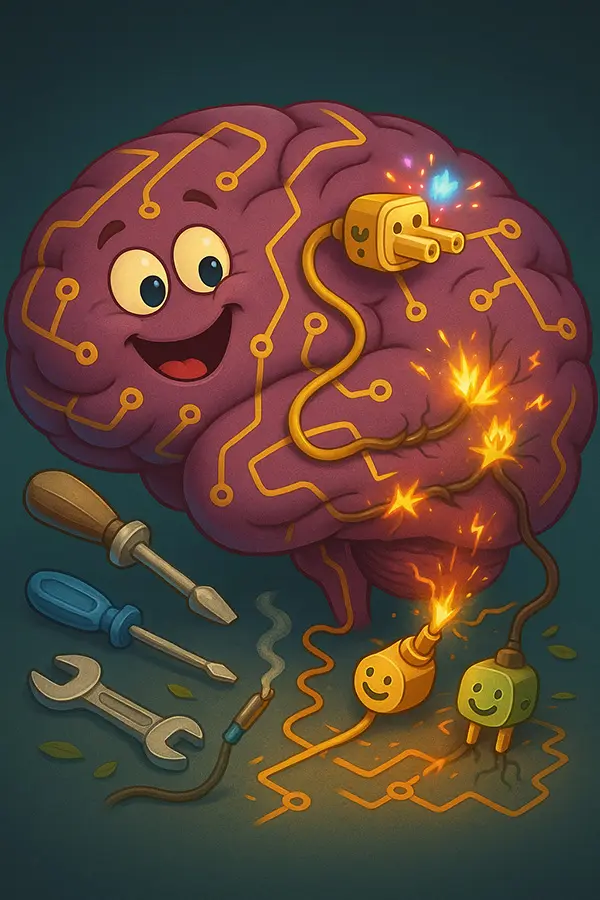
From neuro angle, the prefrontal cortex gets lazy when you outsource worth, per fMRI scans. Shift to internal? Practices like mindfulness rewire it over months. Externally, Psych Central’s trap of external validation breaks it down brilliantly.
Statistics on How Common Validation-Seeking Is
How widespread? Stats say up to 60% of adults report moderate validation needs, spiking to 80% in young folks glued to social media one study on likes found fewer thumbs-ups triggers distress in 70% of users. In workplaces, 40% tie job satisfaction to boss approval, per surveys. Emerging adults? A whopping 75% engage in like-seeking tweaks, like timing posts for max hearts. Globally, women report higher rates due to societal pressures, but it’s climbing for all.
Hormonally, low serotonin folks seek more, with stats showing 50% overlap with anxiety disorders. Vox’s validate me article notes it’s not constant craving, but offsetting invalidation eye-opener.
🟨 Box: Top 3 Studies with Key Stats
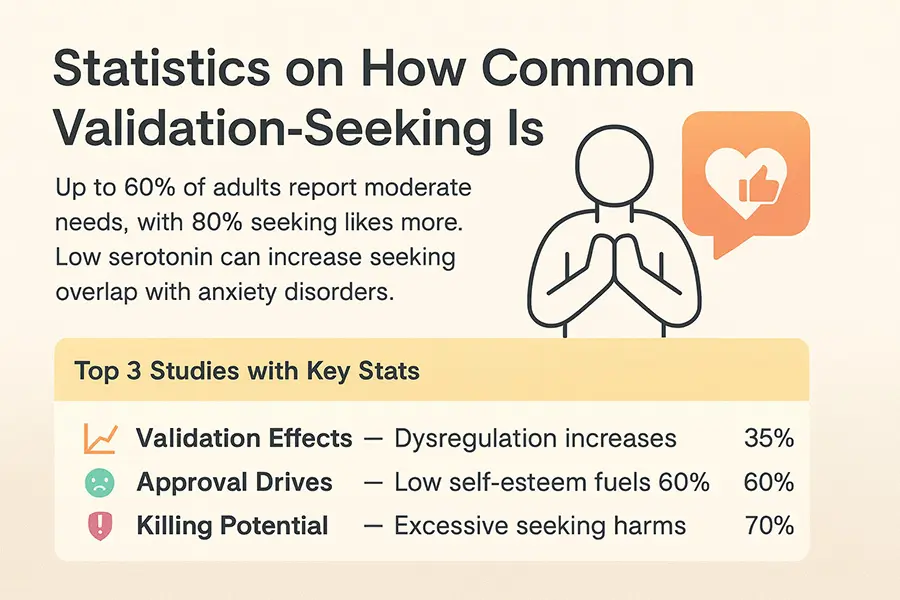
Frequently Asked Questions (FAQ)
Got burning questions? Let’s tackle ’em head-on, no fluff.
Feeling weak for craving that nod? It stings, right, cuz it loops shame, making you chase harder just to feel okay. But rewire gently start with daily mantras and breathing; over time, it builds lasting security, like fortifying a castle from within. Our self-compassion toolkit helps.
Worried it’s unhealthy dependency? It can override self-trust, leaving you hollow when alone. Balance by nurturing solo joys without ditching connections therapy sorts the blend. Check codependency basics.
Picking toxic sources? Ouch, it piles pain, eroding your core. Prioritize inner wells first journal triggers, seek healthy circles. Turns destruction to growth. 😔
Suspecting deeper stuff? Ignoring worsens symptoms like mood dips. Explore with therapists for clarity links to anxiety, depression, BPD. Psychology Today’s validation stop dives in.
Addicted to praise? Temporary highs restart loops, frustrating af. Build self-trust via small wins track ’em daily, watch dependency fade. 💪
Comparing to disorders? Misunderstanding traits confuses your path. Differentiate: narcissists for ego, ADHD via RSD address unique needs with tailored tools. Our ADHD burnout guide connects dots.
Resources and Reliable Links
Wrapping up? Arm yourself with these gems. Internally: Dive deeper with breaking free from approval addiction or emotional dependencies. Externally: Psych Central’s steps to stop approval 9Still Mind on validation causes 13Quora on external impacts . Therapy apps like BetterHelp or books like “The Gifts of Imperfection” by Brené Brown? Game-changers. Start small, build big you got this! 🚀
✨ Last updated on 22.09.2025
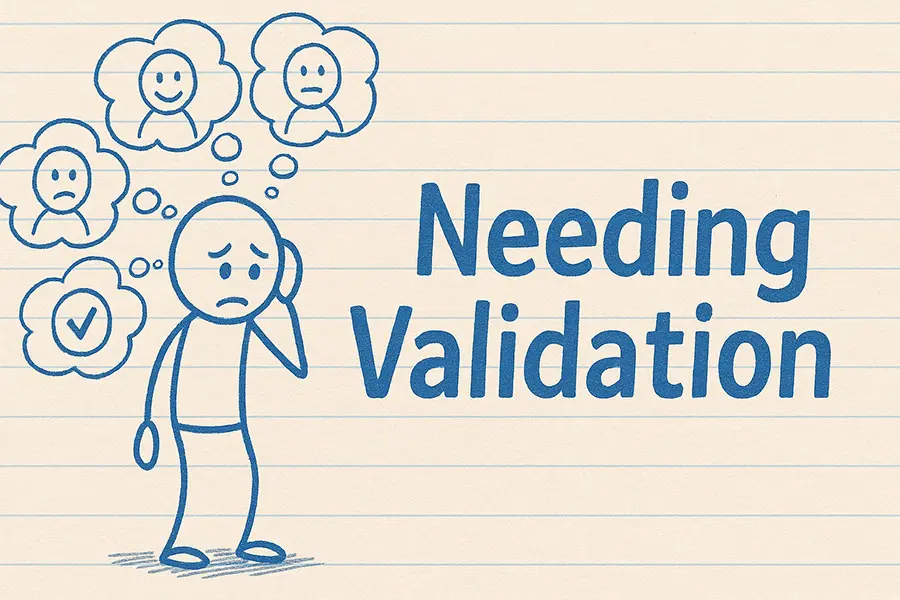










Leave a Reply